高中英语北师大版(2019)必修第三册Unit 8 Green Living Lesson 3 Language points 课件-(25张ppt)
文档属性
| 名称 | 高中英语北师大版(2019)必修第三册Unit 8 Green Living Lesson 3 Language points 课件-(25张ppt) | 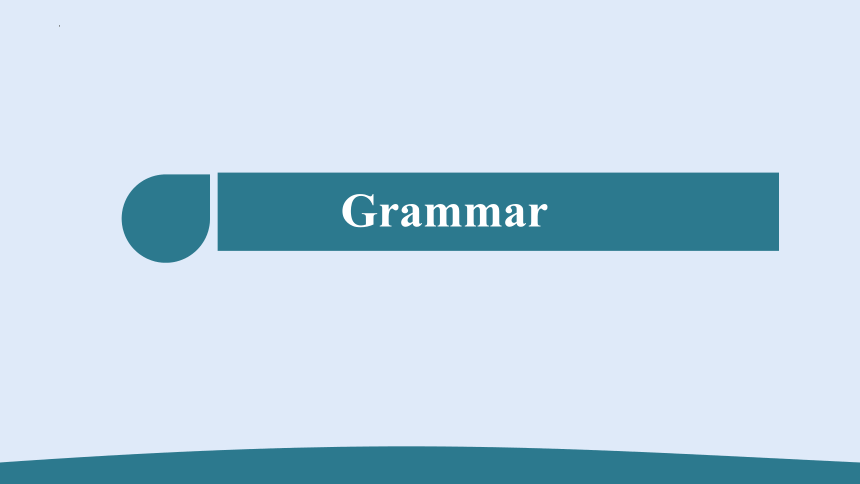 | |
| 格式 | zip | ||
| 文件大小 | 155.7KB | ||
| 资源类型 | 教案 | ||
| 版本资源 | 北师大版(2019) | ||
| 科目 | 英语 | ||
| 更新时间 | 2022-07-02 18:42:44 | ||
图片预览

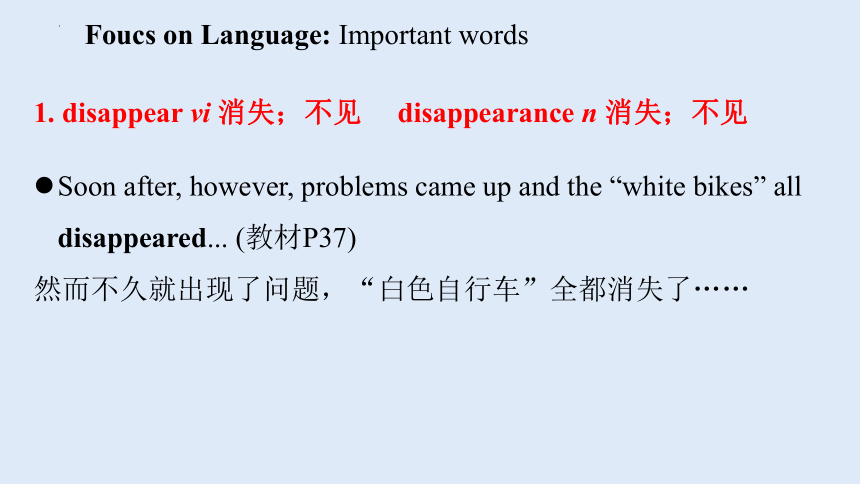
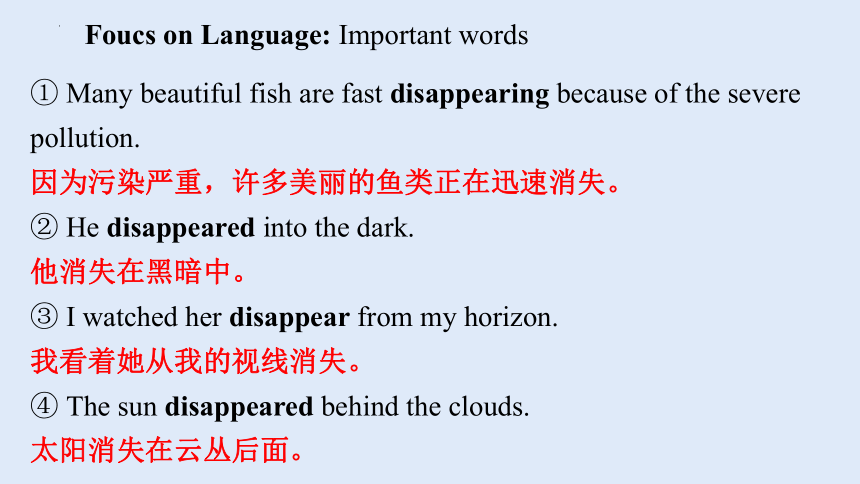
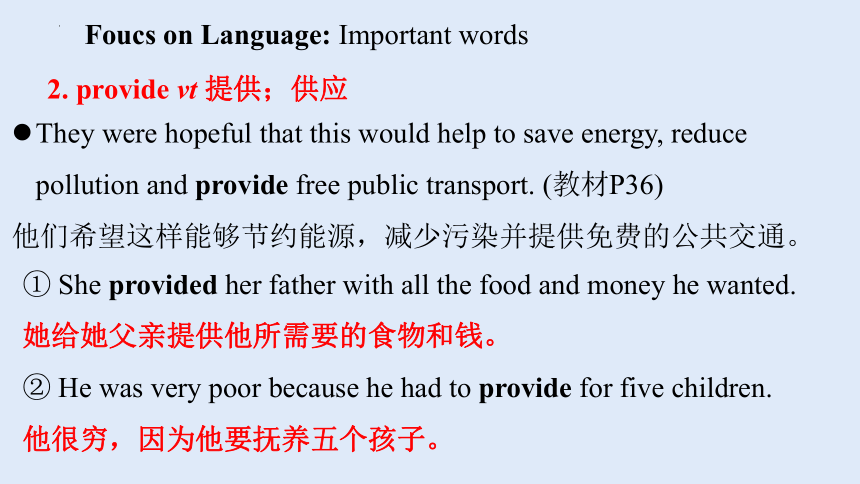
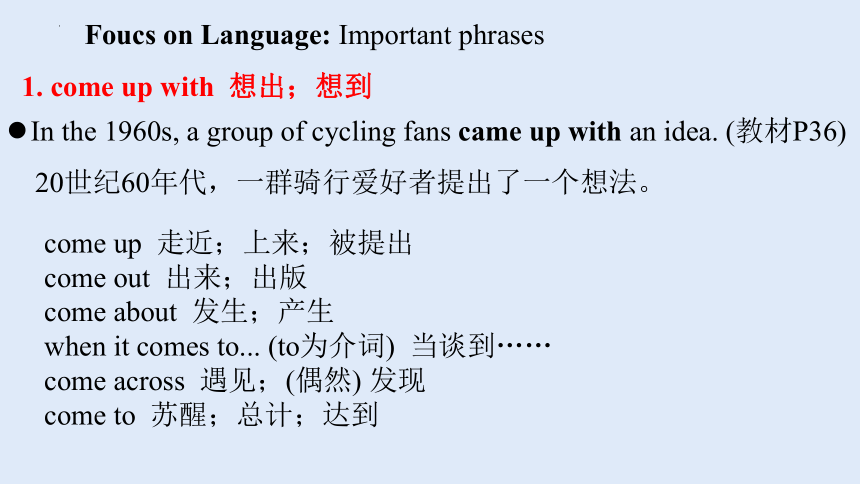
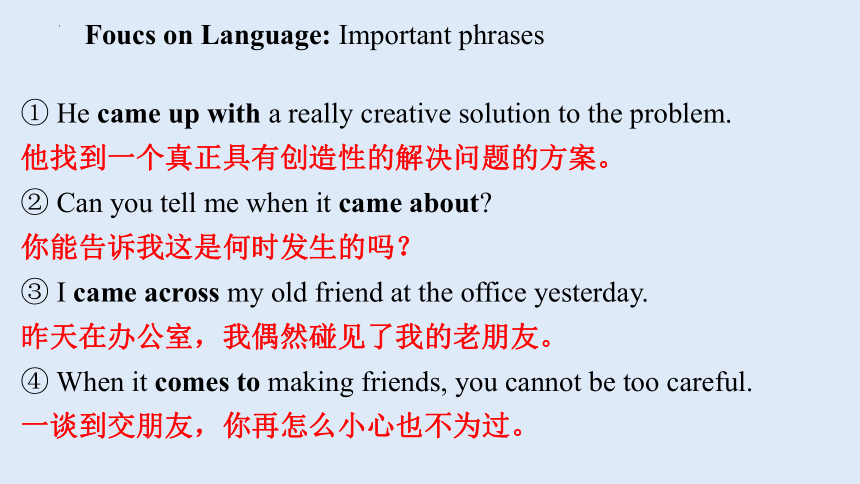
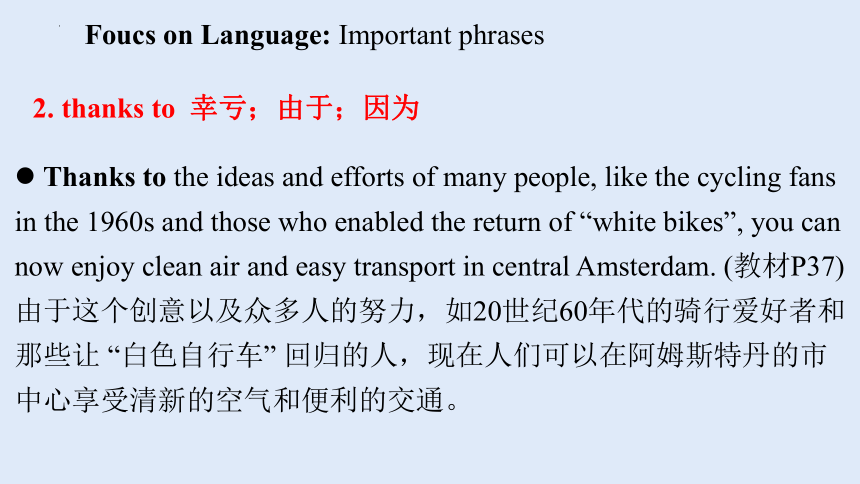
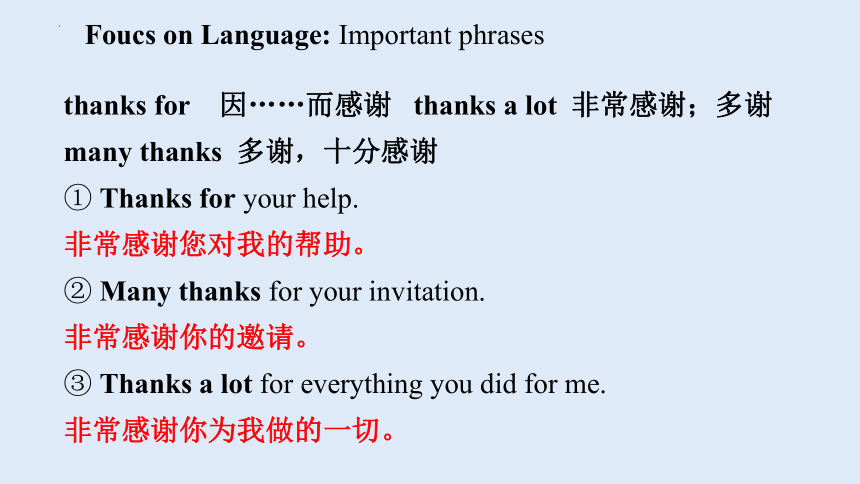
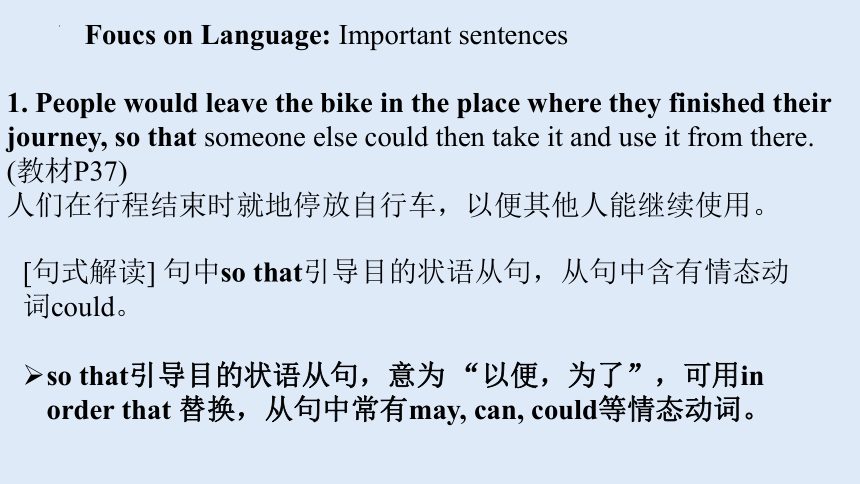
文档简介
(共25张PPT)
Grammar
1. disappear vi 消失;不见 disappearance n 消失;不见
Soon after, however, problems came up and the “white bikes” all disappeared... (教材P37)
然而不久就出现了问题,“白色自行车”全都消失了……
Foucs on Language: Important words
① Many beautiful fish are fast disappearing because of the severe pollution.
因为污染严重,许多美丽的鱼类正在迅速消失。
② He disappeared into the dark.
他消失在黑暗中。
③ I watched her disappear from my horizon.
我看着她从我的视线消失。
④ The sun disappeared behind the clouds.
太阳消失在云丛后面。
Foucs on Language: Important words
2. provide vt 提供;供应
They were hopeful that this would help to save energy, reduce pollution and provide free public transport. (教材P36)
他们希望这样能够节约能源,减少污染并提供免费的公共交通。
① She provided her father with all the food and money he wanted.
她给她父亲提供他所需要的食物和钱。
② He was very poor because he had to provide for five children.
他很穷,因为他要抚养五个孩子。
Foucs on Language: Important words
1. come up with 想出;想到
In the 1960s, a group of cycling fans came up with an idea. (教材P36)
20世纪60年代,一群骑行爱好者提出了一个想法。
come up 走近;上来;被提出
come out 出来;出版
come about 发生;产生
when it comes to... (to为介词) 当谈到……
come across 遇见;(偶然) 发现
come to 苏醒;总计;达到
Foucs on Language: Important phrases
① He came up with a really creative solution to the problem.
他找到一个真正具有创造性的解决问题的方案。
② Can you tell me when it came about
你能告诉我这是何时发生的吗?
③ I came across my old friend at the office yesterday.
昨天在办公室,我偶然碰见了我的老朋友。
④ When it comes to making friends, you cannot be too careful.
一谈到交朋友,你再怎么小心也不为过。
Foucs on Language: Important phrases
2. thanks to 幸亏;由于;因为
Thanks to the ideas and efforts of many people, like the cycling fans in the 1960s and those who enabled the return of “white bikes”, you can now enjoy clean air and easy transport in central Amsterdam. (教材P37)
由于这个创意以及众多人的努力,如20世纪60年代的骑行爱好者和那些让 “白色自行车” 回归的人,现在人们可以在阿姆斯特丹的市中心享受清新的空气和便利的交通。
Foucs on Language: Important phrases
thanks for 因……而感谢 thanks a lot 非常感谢;多谢
many thanks 多谢,十分感谢
① Thanks for your help.
非常感谢您对我的帮助。
② Many thanks for your invitation.
非常感谢你的邀请。
③ Thanks a lot for everything you did for me.
非常感谢你为我做的一切。
Foucs on Language: Important phrases
1. People would leave the bike in the place where they finished their journey, so that someone else could then take it and use it from there. (教材P37)
人们在行程结束时就地停放自行车,以便其他人能继续使用。
Foucs on Language: Important sentences
[句式解读] 句中so that引导目的状语从句,从句中含有情态动词could。
so that引导目的状语从句,意为 “以便,为了”,可用in order that 替换,从句中常有may, can, could等情态动词。
① I will leave so that you can concentrate on your work.
我这就走,以便让你专心工作。
② He came in quietly so that he wouldn’t wake his wife up.
他轻轻地进来,为了不把他的妻子吵醒。
Foucs on Language: Important sentences
③ I got up early, so that I caught the first bus.
我起得很早,所以赶上了第一班公共汽车。
④ Suddenly it began to rain heavily, so that it was almost impossible to carry on driving.
突然下起了大雨,几乎无法继续开车。
so that引导结果状语从句,意为 “因此,所以”,通常不与情态动词连用,从句前可用逗号与主句隔开。
Foucs on Language: Important sentences
2. To take a bicycle, you had to put in a special card. (教材P37)
要使用自行车,必须插入专用的卡片。
[句式解读] 句中to take a bicycle为不定式短语作目的状语。
动词不定式作目的状语通常译为“为了……”,主要有以下三种结构形式:
Foucs on Language: Important sentences
结构形式 位置 说明
(not) to do... 句首、句尾 位于句首时,表示强调目的。
in order (not) to do... 句首、句尾 这种结构形式更能突出目的性,为了表示强调,常置于句首。
so as (not) to do... 句尾 这种结构形式也是为了突出状语的目的性,与第二种结构形式所不同的主要是位置的区别。
Foucs on Language: Important sentences
① They worked hard to get good marks in the final exams.
为了在期末考试中得到高分,他们很用功。
② They took exercise every day to keep healthy.
他们为了保持健康每天运动。
③ In order to learn spoken English well, he often talks with American friends.
为了学好口语他常常和美国朋友交谈。
④ Lily saw many Chinese films so as to know more about China.
莉莉看了很多中国电影以便更多地了解中国。
Foucs on Language: Important sentences
名词用作动词
Focus on Grammar
一、在英文中,有许多“名词活用作动词”的现象。或者说,这些单词本身就有动词的意思,只是我们在学习这些单词的时候通常只接触了其名词的意思。
举个最简单的例子 “man” 这个单词,我们都知道是人、男人的意思,但它也可以作动词,有操作、配置人员、使增强勇气、拿出男子气概等意思。
You need to man up and own up to your mistake.
你要像个男人一样承认自己的错误。
Focus on Grammar
二、熟练掌握这种名词和动词之间的转换具有非常重要的意义,对于我们英语水平的提高也至关重要。它的主要作用体现在:
1.让语言更加简洁
比如说表示“我坐公共汽车去上班”这个意思,你可以说“I take a bus to work”也可以说“I bus to work”。
当bus作动词时既包含了乘坐这个动作,又包含了所乘坐的交通工具,所以可以帮助省略不必要的take,让说话写作更加简洁明了。
Focus on Grammar
2.使语言更加生动
比如corner这个单词,名词意思是角落、墙角,动词的意思则有转弯、垄断、使为难等等。
With this new technology, we are going to corner the market within the next two years.有了这项新科技,我们将在未来两年垄断市场。
当corner这个单词作垄断意思解释的时候非常形象,想象一下一家公司把所有竞争者都逼到了墙角,这不就是垄断吗?
还有个单词entrance,名词解释是入口,但当它作动词时就变成了使着迷、欣喜若狂。
Her beauty entrances him. 她的美丽让他痴迷。
所以如果能做到名词的动词活用,可以使英文的语句更加具有画面感。
Focus on Grammar
3.使语言更加地道
比如用英文表达 “他著有两本畅销小说”。
当然可以说“He has written two best-selling novels”,但这里的write让人感觉只是“写”,而没有“著”,所以会显得不够书面,不够地道。
如果用authored来取代written就可以准确地表达出句子。
英文单词中名词作动词的情形远远不止以上的例子。
比如还有一组植物的名词,像花flower、杂草weed、植物plant、种子seed、根root等等都可以作动词使用,分别是成熟、除草、种植、播种、固定的意思。
Focus on Grammar
随着人类社会的不断前进,语言也不断地向前发展,旧词少用,新词产生,语言变得越来越生动、形象,富于表现力和丰富多彩。人们常常用转化法、合成法、派生法等来创造新词。
转化法: 就是词类转化,或叫词性转化,即利用某些词本身固有的特点,把原属于一类词性的词转化成另一种词类,即一种词类不经过任何词态变化而有意地作另一类词使用,同时又没有失去原有词内在的意思。
Focus on Grammar
VI
Homework
假设你是星光中学的李华,将参加主题为“Let’s Ride Bicycles” 的英语演讲比赛。请撰写一份演讲稿,主要内容包括:
1. 目前汽车带来的空气污染和交通堵塞等问题;
2. 骑自行车的益处,如节能环保、有利健康等。
参考词汇:低碳生活 (low carbon life);节能 (energy saving)
注意:
1. 词数:120词左右;
2. 演讲稿开头和结尾已给出,不计入总词数。
Homework
结构分析
节能
环保
有益健康
汽车
优点:带来方便, 重要交通方式
带来问题:空气污染、交通堵塞
自行车
倡导: 自己的观点
Homework
参考词汇:
convenient
traffic jam
save energy
envirnomentally friendly
benefit / beneficial
low carbon life
energy-saving
keep fit
Homework
Thank you
Grammar
1. disappear vi 消失;不见 disappearance n 消失;不见
Soon after, however, problems came up and the “white bikes” all disappeared... (教材P37)
然而不久就出现了问题,“白色自行车”全都消失了……
Foucs on Language: Important words
① Many beautiful fish are fast disappearing because of the severe pollution.
因为污染严重,许多美丽的鱼类正在迅速消失。
② He disappeared into the dark.
他消失在黑暗中。
③ I watched her disappear from my horizon.
我看着她从我的视线消失。
④ The sun disappeared behind the clouds.
太阳消失在云丛后面。
Foucs on Language: Important words
2. provide vt 提供;供应
They were hopeful that this would help to save energy, reduce pollution and provide free public transport. (教材P36)
他们希望这样能够节约能源,减少污染并提供免费的公共交通。
① She provided her father with all the food and money he wanted.
她给她父亲提供他所需要的食物和钱。
② He was very poor because he had to provide for five children.
他很穷,因为他要抚养五个孩子。
Foucs on Language: Important words
1. come up with 想出;想到
In the 1960s, a group of cycling fans came up with an idea. (教材P36)
20世纪60年代,一群骑行爱好者提出了一个想法。
come up 走近;上来;被提出
come out 出来;出版
come about 发生;产生
when it comes to... (to为介词) 当谈到……
come across 遇见;(偶然) 发现
come to 苏醒;总计;达到
Foucs on Language: Important phrases
① He came up with a really creative solution to the problem.
他找到一个真正具有创造性的解决问题的方案。
② Can you tell me when it came about
你能告诉我这是何时发生的吗?
③ I came across my old friend at the office yesterday.
昨天在办公室,我偶然碰见了我的老朋友。
④ When it comes to making friends, you cannot be too careful.
一谈到交朋友,你再怎么小心也不为过。
Foucs on Language: Important phrases
2. thanks to 幸亏;由于;因为
Thanks to the ideas and efforts of many people, like the cycling fans in the 1960s and those who enabled the return of “white bikes”, you can now enjoy clean air and easy transport in central Amsterdam. (教材P37)
由于这个创意以及众多人的努力,如20世纪60年代的骑行爱好者和那些让 “白色自行车” 回归的人,现在人们可以在阿姆斯特丹的市中心享受清新的空气和便利的交通。
Foucs on Language: Important phrases
thanks for 因……而感谢 thanks a lot 非常感谢;多谢
many thanks 多谢,十分感谢
① Thanks for your help.
非常感谢您对我的帮助。
② Many thanks for your invitation.
非常感谢你的邀请。
③ Thanks a lot for everything you did for me.
非常感谢你为我做的一切。
Foucs on Language: Important phrases
1. People would leave the bike in the place where they finished their journey, so that someone else could then take it and use it from there. (教材P37)
人们在行程结束时就地停放自行车,以便其他人能继续使用。
Foucs on Language: Important sentences
[句式解读] 句中so that引导目的状语从句,从句中含有情态动词could。
so that引导目的状语从句,意为 “以便,为了”,可用in order that 替换,从句中常有may, can, could等情态动词。
① I will leave so that you can concentrate on your work.
我这就走,以便让你专心工作。
② He came in quietly so that he wouldn’t wake his wife up.
他轻轻地进来,为了不把他的妻子吵醒。
Foucs on Language: Important sentences
③ I got up early, so that I caught the first bus.
我起得很早,所以赶上了第一班公共汽车。
④ Suddenly it began to rain heavily, so that it was almost impossible to carry on driving.
突然下起了大雨,几乎无法继续开车。
so that引导结果状语从句,意为 “因此,所以”,通常不与情态动词连用,从句前可用逗号与主句隔开。
Foucs on Language: Important sentences
2. To take a bicycle, you had to put in a special card. (教材P37)
要使用自行车,必须插入专用的卡片。
[句式解读] 句中to take a bicycle为不定式短语作目的状语。
动词不定式作目的状语通常译为“为了……”,主要有以下三种结构形式:
Foucs on Language: Important sentences
结构形式 位置 说明
(not) to do... 句首、句尾 位于句首时,表示强调目的。
in order (not) to do... 句首、句尾 这种结构形式更能突出目的性,为了表示强调,常置于句首。
so as (not) to do... 句尾 这种结构形式也是为了突出状语的目的性,与第二种结构形式所不同的主要是位置的区别。
Foucs on Language: Important sentences
① They worked hard to get good marks in the final exams.
为了在期末考试中得到高分,他们很用功。
② They took exercise every day to keep healthy.
他们为了保持健康每天运动。
③ In order to learn spoken English well, he often talks with American friends.
为了学好口语他常常和美国朋友交谈。
④ Lily saw many Chinese films so as to know more about China.
莉莉看了很多中国电影以便更多地了解中国。
Foucs on Language: Important sentences
名词用作动词
Focus on Grammar
一、在英文中,有许多“名词活用作动词”的现象。或者说,这些单词本身就有动词的意思,只是我们在学习这些单词的时候通常只接触了其名词的意思。
举个最简单的例子 “man” 这个单词,我们都知道是人、男人的意思,但它也可以作动词,有操作、配置人员、使增强勇气、拿出男子气概等意思。
You need to man up and own up to your mistake.
你要像个男人一样承认自己的错误。
Focus on Grammar
二、熟练掌握这种名词和动词之间的转换具有非常重要的意义,对于我们英语水平的提高也至关重要。它的主要作用体现在:
1.让语言更加简洁
比如说表示“我坐公共汽车去上班”这个意思,你可以说“I take a bus to work”也可以说“I bus to work”。
当bus作动词时既包含了乘坐这个动作,又包含了所乘坐的交通工具,所以可以帮助省略不必要的take,让说话写作更加简洁明了。
Focus on Grammar
2.使语言更加生动
比如corner这个单词,名词意思是角落、墙角,动词的意思则有转弯、垄断、使为难等等。
With this new technology, we are going to corner the market within the next two years.有了这项新科技,我们将在未来两年垄断市场。
当corner这个单词作垄断意思解释的时候非常形象,想象一下一家公司把所有竞争者都逼到了墙角,这不就是垄断吗?
还有个单词entrance,名词解释是入口,但当它作动词时就变成了使着迷、欣喜若狂。
Her beauty entrances him. 她的美丽让他痴迷。
所以如果能做到名词的动词活用,可以使英文的语句更加具有画面感。
Focus on Grammar
3.使语言更加地道
比如用英文表达 “他著有两本畅销小说”。
当然可以说“He has written two best-selling novels”,但这里的write让人感觉只是“写”,而没有“著”,所以会显得不够书面,不够地道。
如果用authored来取代written就可以准确地表达出句子。
英文单词中名词作动词的情形远远不止以上的例子。
比如还有一组植物的名词,像花flower、杂草weed、植物plant、种子seed、根root等等都可以作动词使用,分别是成熟、除草、种植、播种、固定的意思。
Focus on Grammar
随着人类社会的不断前进,语言也不断地向前发展,旧词少用,新词产生,语言变得越来越生动、形象,富于表现力和丰富多彩。人们常常用转化法、合成法、派生法等来创造新词。
转化法: 就是词类转化,或叫词性转化,即利用某些词本身固有的特点,把原属于一类词性的词转化成另一种词类,即一种词类不经过任何词态变化而有意地作另一类词使用,同时又没有失去原有词内在的意思。
Focus on Grammar
VI
Homework
假设你是星光中学的李华,将参加主题为“Let’s Ride Bicycles” 的英语演讲比赛。请撰写一份演讲稿,主要内容包括:
1. 目前汽车带来的空气污染和交通堵塞等问题;
2. 骑自行车的益处,如节能环保、有利健康等。
参考词汇:低碳生活 (low carbon life);节能 (energy saving)
注意:
1. 词数:120词左右;
2. 演讲稿开头和结尾已给出,不计入总词数。
Homework
结构分析
节能
环保
有益健康
汽车
优点:带来方便, 重要交通方式
带来问题:空气污染、交通堵塞
自行车
倡导: 自己的观点
Homework
参考词汇:
convenient
traffic jam
save energy
envirnomentally friendly
benefit / beneficial
low carbon life
energy-saving
keep fit
Homework
Thank you
同课章节目录
- Unit 7 Art
- Lesson 1 Masterpieces
- Lesson 2 Beijing Opera
- Lesson 3 A Musical Genius
- Unit 8 Green living
- Lesson 1 Roots and Shoots
- Lesson 2 Greening the Desert
- Lesson 3 "White Bikes" on the Road
- Unit 9 Learning
- Lesson 1 Active Learning
- Lesson 2 Language Learning Tips
- Lesson 3 The Secrets of Your Memory
